Field of study in Wageningen: Bachelor Biology
Study period exchange: 29/01/2024 – 21/06/2024
Country (exchange): United Kingdom
City (exchange): Nottingham
University (exchange): University of Nottingham
Faculty (exchange): Biosciences
2. Motivation for exchange
Why did you choose to go on study exchange?
I really wanted to experience living in a different country with a different culture. My dream has always been to travel a lot, so I couldn’t let this opportunity slip.
What is the reason you chose for this country?
I looked at a lot of different countries. My first choice was Australia, but I decided to choose a different first option since those exchange places are tough to get because of competition. I’ve been to the UK before on holiday and really liked it and there is no language barrier as I’m quite good at English. It’s also relatively easy to get there.
What is the reason you chose for this university?
I chose the University of Nottingham (UoN) because of the modules they offered and the geographical location. It was one of the less competitive exchange locations. I mostly looked at the modules the different universities provided and could remove a lot of universities because they didn’t have any interesting modules for me. I ended up with this university and the University of Aberystwyth. I went for Nottingham as it’s location was way more central in the UK which made it easier to travel to different places. The University of Aberystwyth is located at the Welsh coast and looked really pretty but had no nearby cities I could visit.
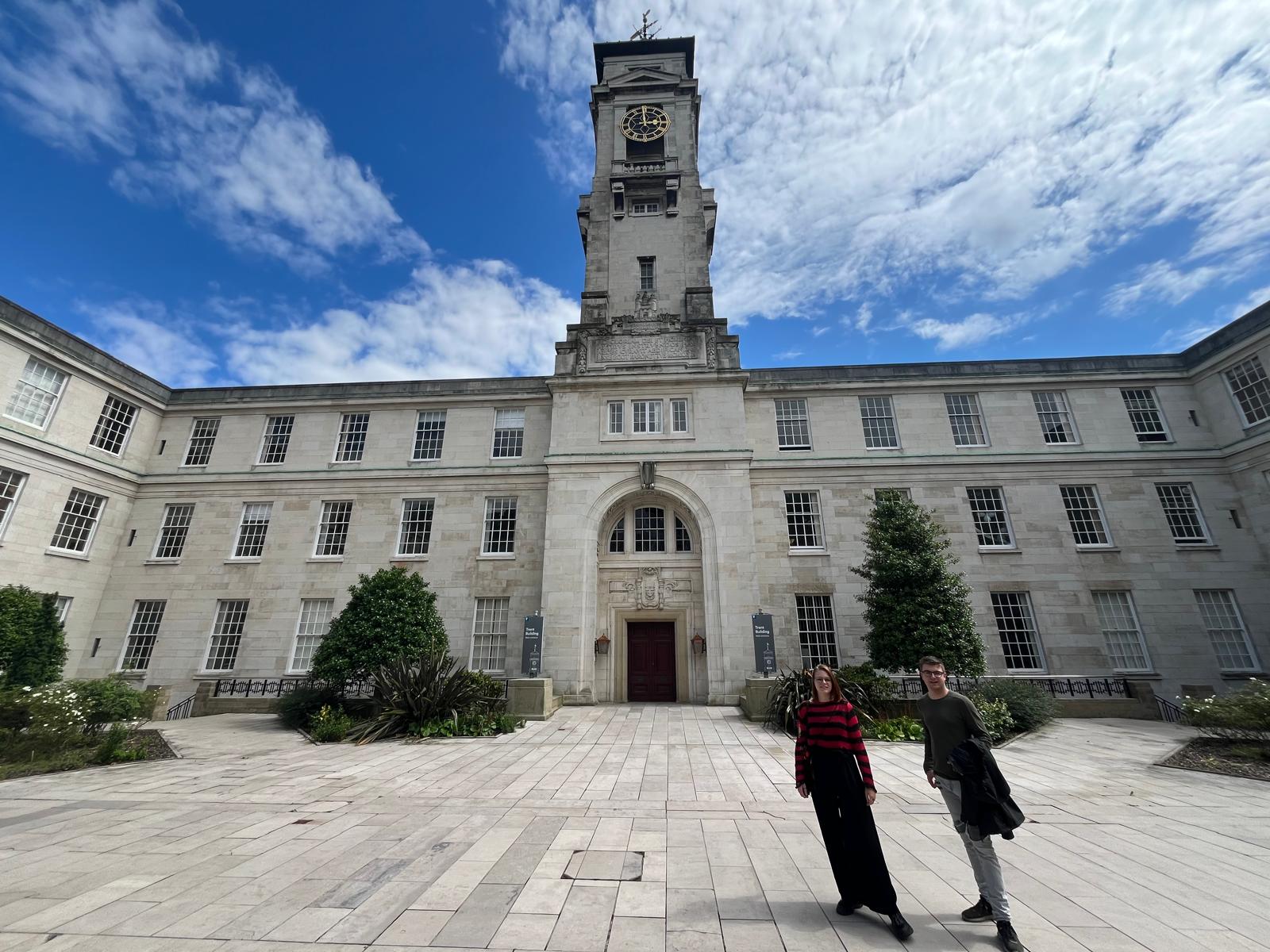
3. Accessibility to reach destination
Do you have any advice about reaching your exchange destination?
I think there are four ways to travel there from the Netherlands. You could go by plane, by train, by car or by car and boat. I met friends there who went by plane and by train (via the tunnel), but I went by car and boat. My parents were willing to bring me there so we rode with our campervan, which could fit loads of bags, to Calais, took the boat to Dover and rode to Nottingham. On the way back we went via Harwich – Hoek van Holland. When travelling by car (and boat) or by train be prepared to travel for a full day. The UK is bigger than you think. If your parents are crazy enough to bring you there be sure to know beforehand whether they’ll pick you up after your exchange so you can adept your amount of luggage to that. By plane or by train you can bring way less and don’t forget you have to carry all your stuff from/to the plane or train.
4. University and studying
Could you provide some general information about the followed courses?
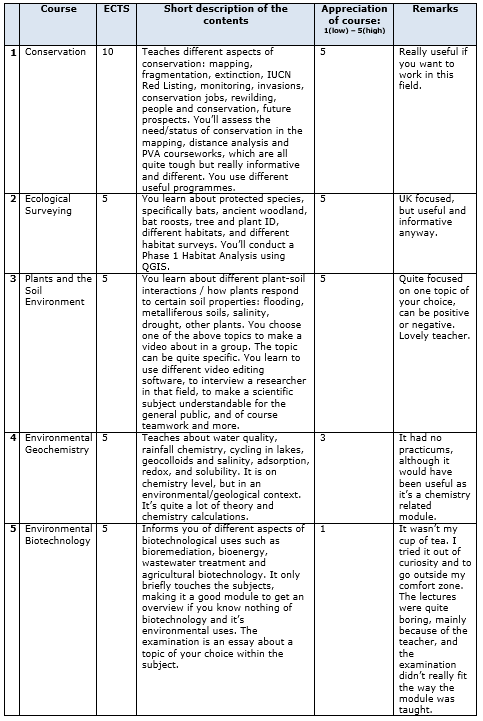
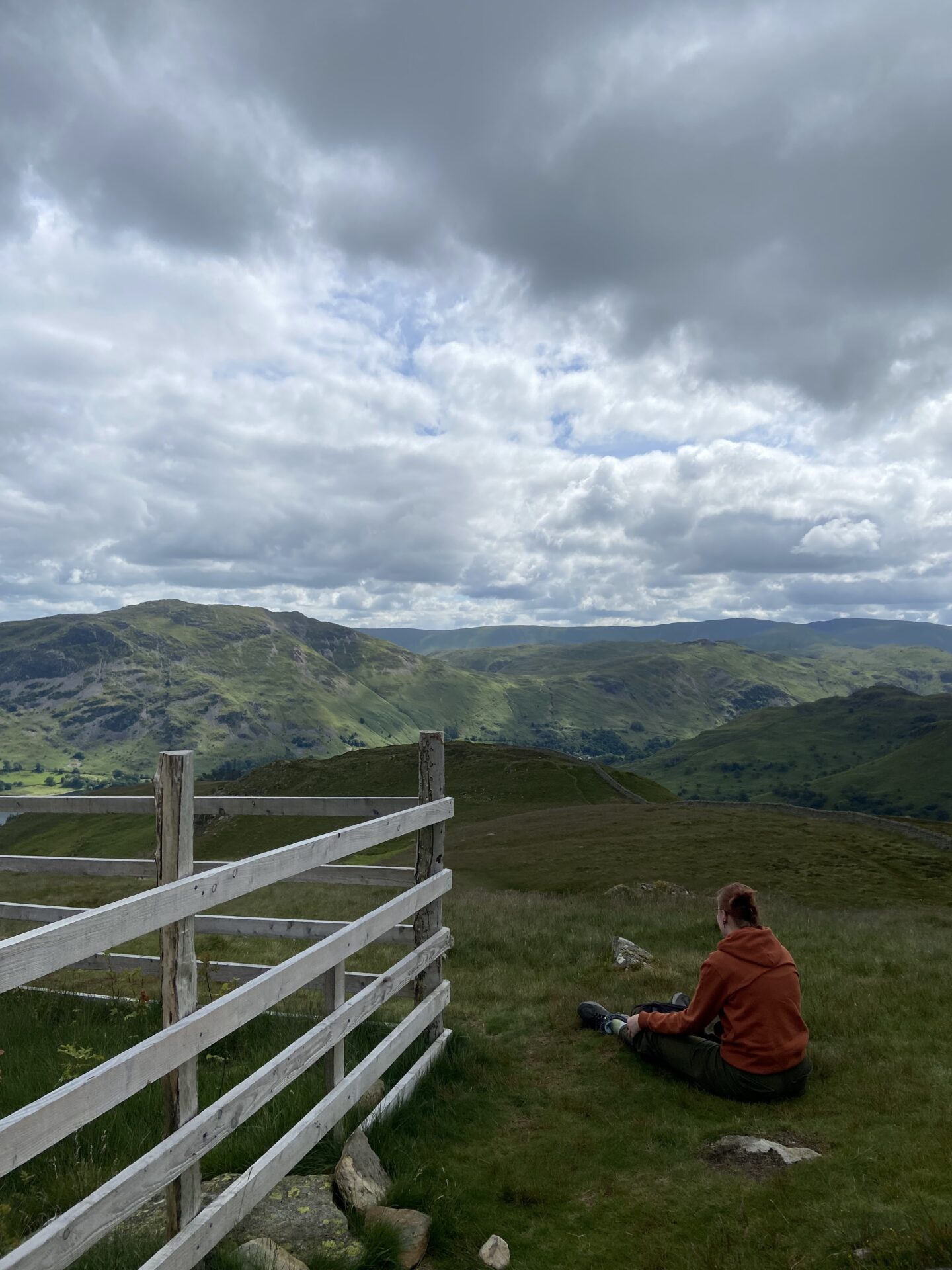 I had sufficient possibilities to select suitable courses that were taught in English:
I had sufficient possibilities to select suitable courses that were taught in English:
Yes, all modules were in English.
I had sufficient possibilities to select suitable courses in my field of interest:
Yes, they have quite a lot of modules connected to ecology or biology. I could easily choose five modules for the semester. Not all modules were my exact interest, but I liked going out of my comfort zone.
I am satisfied with the level of the courses that I followed:
No, I had modules in which you would expect practicums to, for example, experiment with the theories given, especially in Environmental Geochemistry, or physically examine the different plants and animals in Ecological Surveying. However, I only had three really short practicums for Ecological Surveying looking at seven different plants (not even determining) and looking at a tree to see if it could have bat roosts. I really missed the understanding of subjects talked about in lectures practicums give me.
I am satisfied, in the end, with the selection of courses I followed:
Yes, even though I didn’t like all of my modules, they gave me a better understanding of different subjects related to ecology and what I’m interested in. I did have to change some of my modules in the beginning because of time clashes, but the new modules I chose were really to my liking.
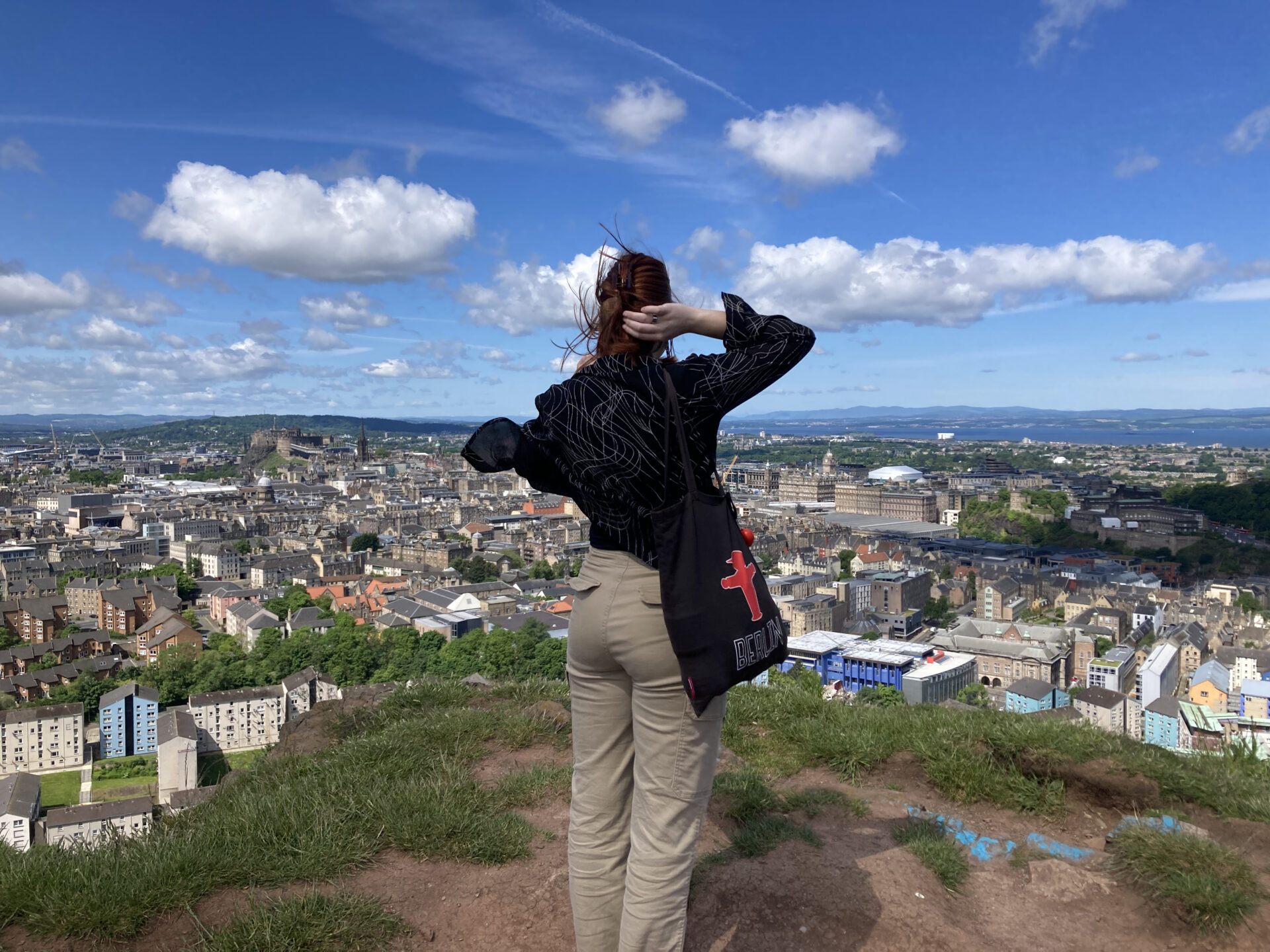
What is it like to study there?
Instead of six periods as at the WUR they have two semesters. It was quite different and made it a bit harder to plan my assignment work and revisions for the exams because most deadlines and exams were in the last five weeks of the semester. I had only about 10-15 contact hours per week: one two-hour lecture of each module per week and sometimes a (computer) practicum. This worried me quite a bit, thinking that I should do a lot of self-study, but there was little self-study except for the assessments. Information on the assessments was mostly given after around the 3rd week, making the workload of the first few weeks really little. We had a total of eleven weeks of lessons, with a full month of holiday in April. The time planning was eight weeks of lessons, four weeks of holiday, three weeks of lessons and assessment deadlines, and three weeks of examinations finishing in the first week of June. As the academic level of the lectures was a bit low in my experience the exchange almost felt like three months of a few lectures and loads of trips, five weeks of stress, and four weeks of holiday because my exchange ended on the 22nd of June. Although I did enjoy the amount of trips I could do I do find it a shame that I didn’t learn that much from some of my modules. The only module which I thought was on the right level and had even a bit too much workload was Conservation.
What is the culture of the university?
The lecturers were all really nice and approachable, just as the student services. There were a lot of activities for international students planned in the beginning, which helped me get to know people and make some good friends. There was some engagement with local students, although it was hard to get to know people who follow the same modules since they were mostly in friend groups already and I find it quite awkward to join a group. I did meet some lovely local students through groupwork, sports, activities hosted in the Halls, and associations.
Just as the WUR the university is a campus. The UoN consists of three campuses with free hopper busses between them. The main campus is University Park. The Jubilee campus is close by and is mostly for economics.
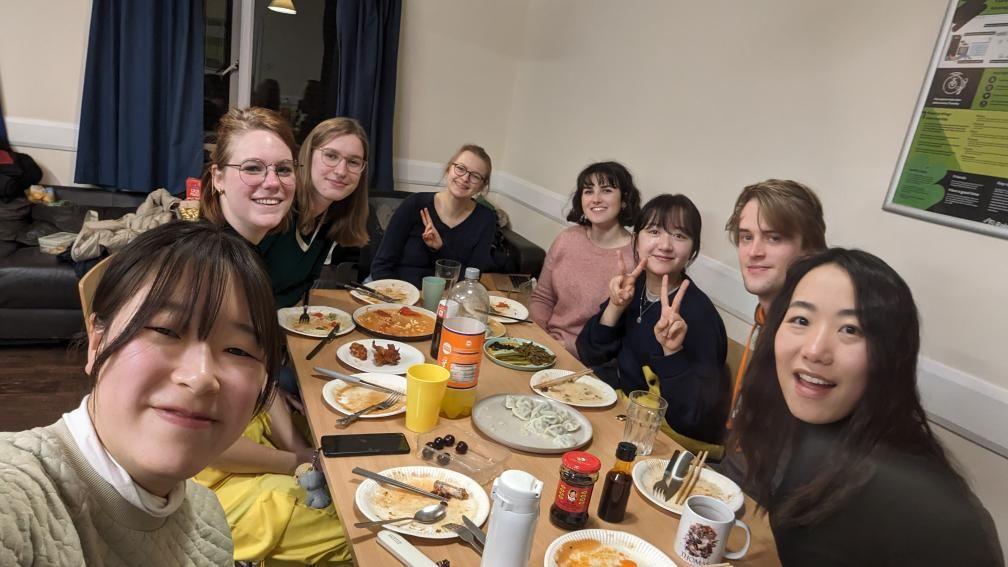
What does the university offer students additionally?
On the campuses there are a lot of living halls and you can choose between catered and non-catered. All halls have a laundry facility, but you do have to pay around 1-2 pounds for every use. All campuses have a sport facility, the largest being David Ross Sports Village on University Park. When living in a catered hall you automatically have a subscription for the sport facilities. The sport facilities are superb and the university has been nominated the sports university of the year for many years. They have a lot of different sport associations which also offer free sessions for non-members. It’s also possible to go to the amazing gym or reserve a court, snooker table, swimming spot, and more. They even have a physiotherapy clinic and café. It’s awesome.
There are A LOT of different societies/associations. Anything you basically can think of. The subscription fees are also minimal, I think most are less than 10 pounds. For example, I joined the a capella society and the travel society for 10 pound each. I know the lgbtq+ society was 3 pounds. I would really recommend joining at least one society or sport association. The travel society was great for exchange students if you want to travel around the UK (or even abroad), they offer daytrips and weekend trips within the UK and a week-long trip abroad for reasonably low prices.
University Park itself is one big, beautiful park including a huge lake. Especially when the weather is nice, it’s really enjoyable to walk around campus, grab a coffee and sit on the grass for example. It is also surrounded by two nature reserves and close to the quaint city centre of Beeston. Everything is quite walkable. The university campuses also have a lot of cafes and University Park has one building with a food court, grocery store, hairdresser, bookstore, merchandise store, café, and even more. It’s useful and fun.
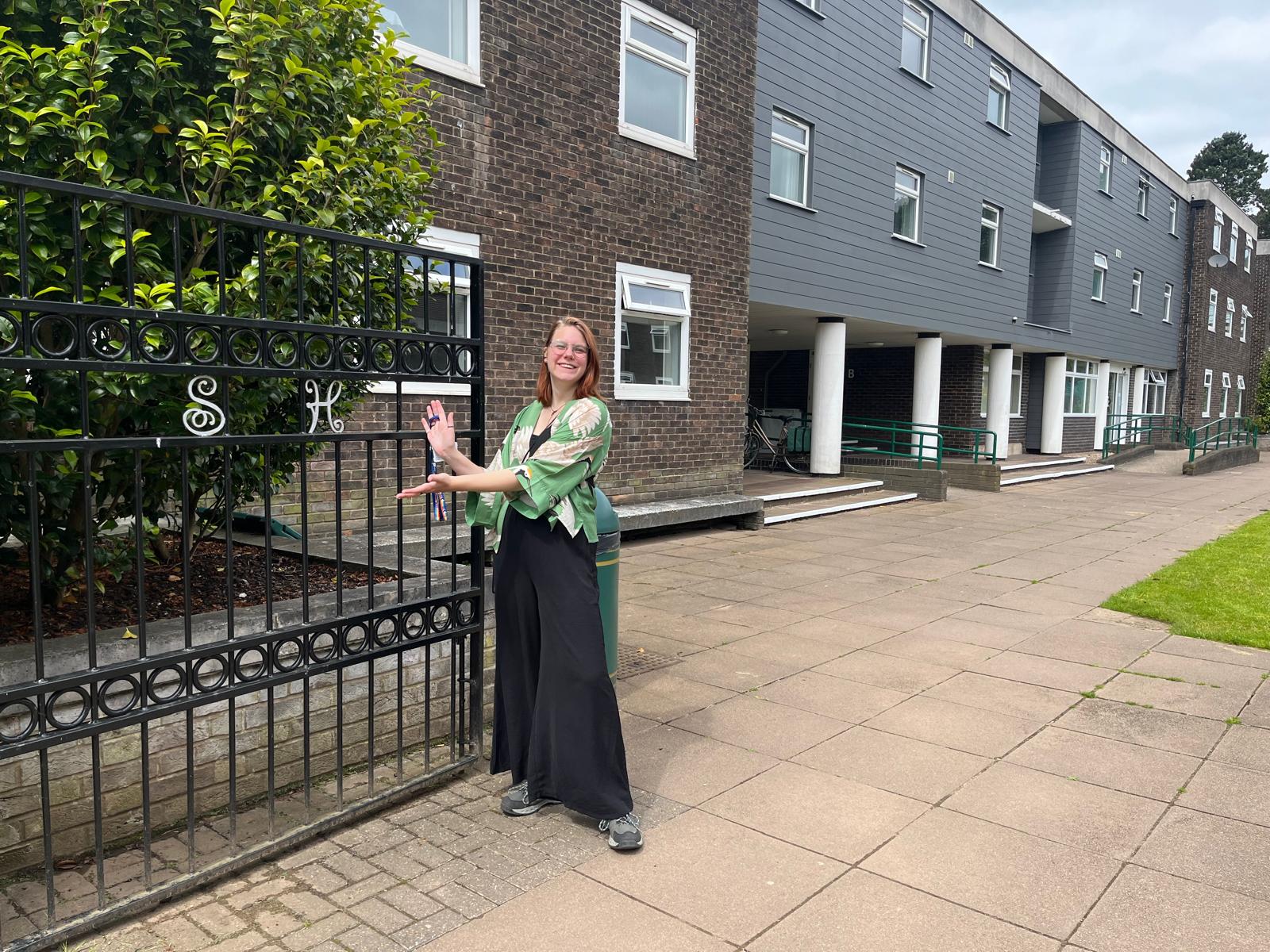
5. Housing-traveling-living
What are the possibilities for housing?
To sign up for a room on campus for half a year is quite easy. There is a link on the website to do it and you can select your preferred options (e.g. catered/non-catered, shared/studio). For me it took a while before I got a reply with a room offer and it wasn’t the exact offer I was hoping for, but I was glad I had something and if I didn’t accept I would have to look for something myself. It is also possible to look for non-university owned houses, but I’m not sure how. As I had a room with a larger bed and shared facilities in a catered hall my rent was expensive. It was around 210 pounds per week, a bit less than 1000 euros per month. Oeff.. I think a friend of mine who had kind of the same but self-catered paid about 130 pounds per week.
What is the culture like?
I would say in general the culture is similar to the Netherlands. There were a few things that stood out to me. The people are more polite but also more prone to make a quick chat. They always ask “How are you?” as a greeting, which is still weird to me even after half a year. The pubs are full of drinking people starting from around 2 pm. And there are A LOT of pubs. The food is similar but might be a bit greasier. Especially at the catered halls. We were served with English breakfast every morning and different meals in the evening, but it contained little vegetables. The snacks are mostly sweet and with chocolate, little savoury snacks. Ah, and don’t forget they drive on the left side of the road. I brought my bike as the campus was quite big, but I never used it as is was too hilly and on the rare occasion that there was a bike lane, it could stop halfway.
Could you give some information about public transport infrastructure?
They have busses, trams, coaches and train. A bus is for the short distances and you can tap in with your debit/creditcard. A tram is also for relatively short distances, but you have to buy a ticket beforehand. They both cost around 2 pounds and are mostly for within the city and nearby cities. To go far distances you can either use a coach, a fancy bus, or a train. Coaches are cheaper but take longer and trains are faster but more expensive. For example, a coach to London takes 3 hours and costs around 10-15 pounds while a train takes 2 hours and costs around 25 pounds. A coach to Edinburgh takes 7 hours and costs around 25 pounds while a train takes 4 hours and costs around 50 pounds. Both trains and coaches must be booked beforehand and the earlier the cheaper. There are various train companies, which makes it harder to book. If you want to use the train a lot I recommend buying a railcard. A railcard for age category 16-25 costs 30 pounds per year and will give you around 30% discount on every train ticket.
On campus I travelled by foot. A lot. It was a 15-minute walk from my hall to most university buildings, a beautiful walk through a grassland. The nearest city centre is Beeston, around 30 minutes by foot. To go to Nottingham city centre I would use the bus, which takes around 20-30 minutes.
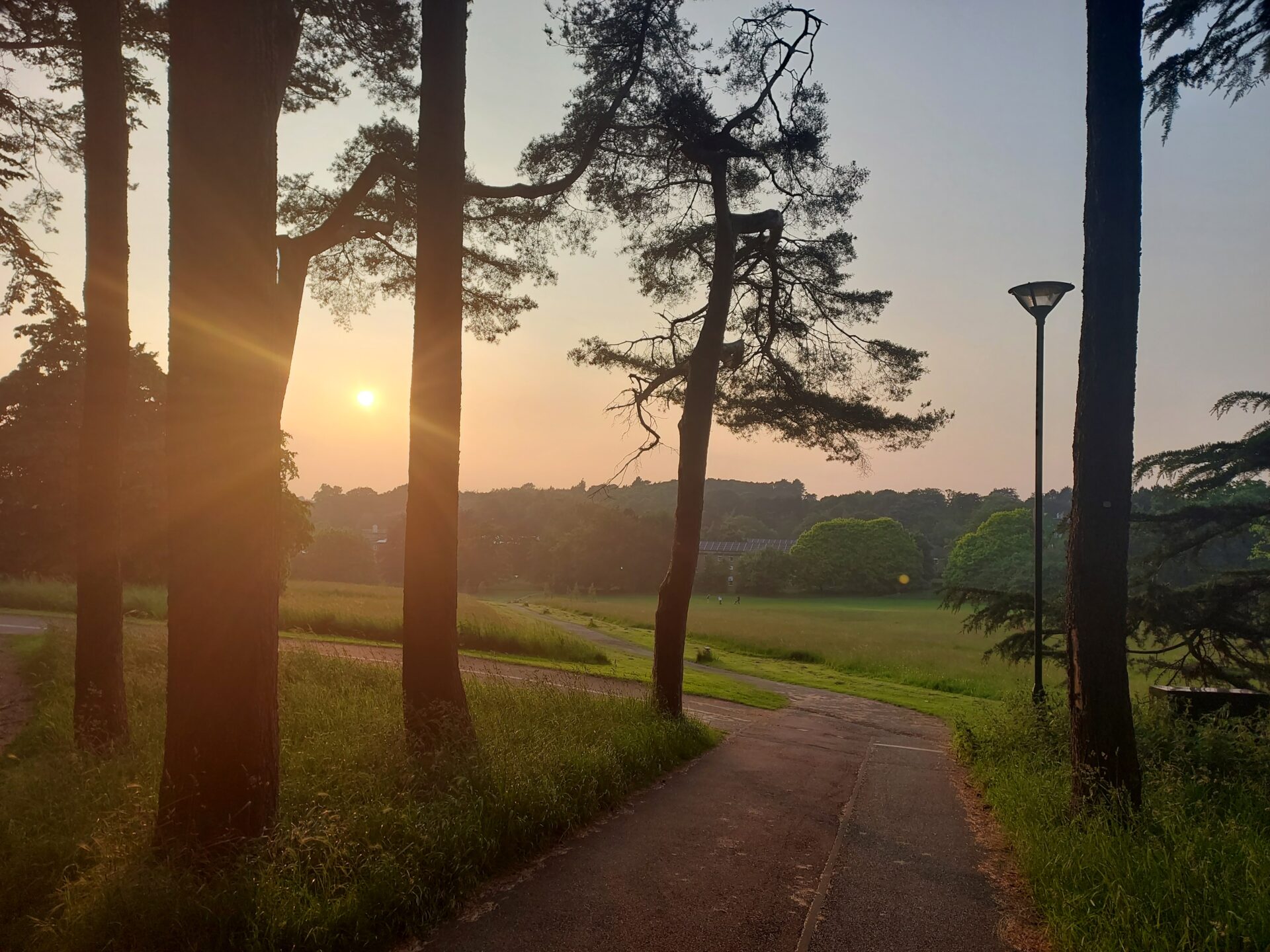
6. Expenses
Can you give an indication of your expenses for/during your exchange?
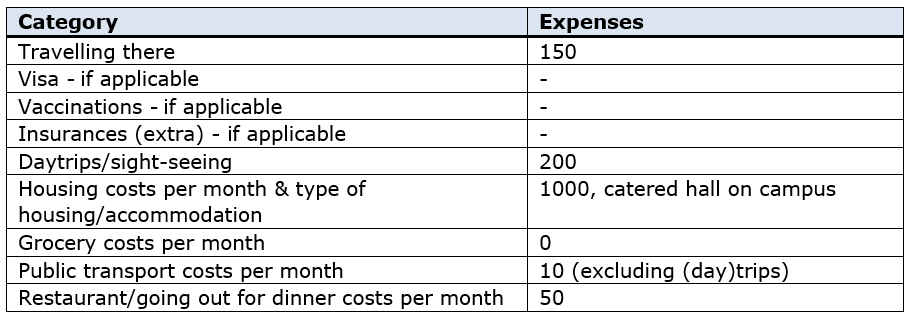
The price levels were in general [higher; lower; equal] in comparison to in the Netherlands:
Equal
Additional remarks regarding expenses?
Be prepared for costs you didn’t take into account. Make sure you always have some extra.
Be aware that when eating/drinking out it is normal that they ask for a tip, you do not have to accept it, but they will be a bit sad. Quite some museums or churches are free to enter but ask for a gift.
Although the euro and pound are quite similar in price, they do differ a bit. I would say to add an extra euro per 5-6 pounds when calculating the price. Especially for large amounts such as your rent it will be a lot more in euros.
Most of the time you can’t use a bankcard, especially for online payments you’ll need a debit or credit card. I also couldn’t use my bankcard for the bus.
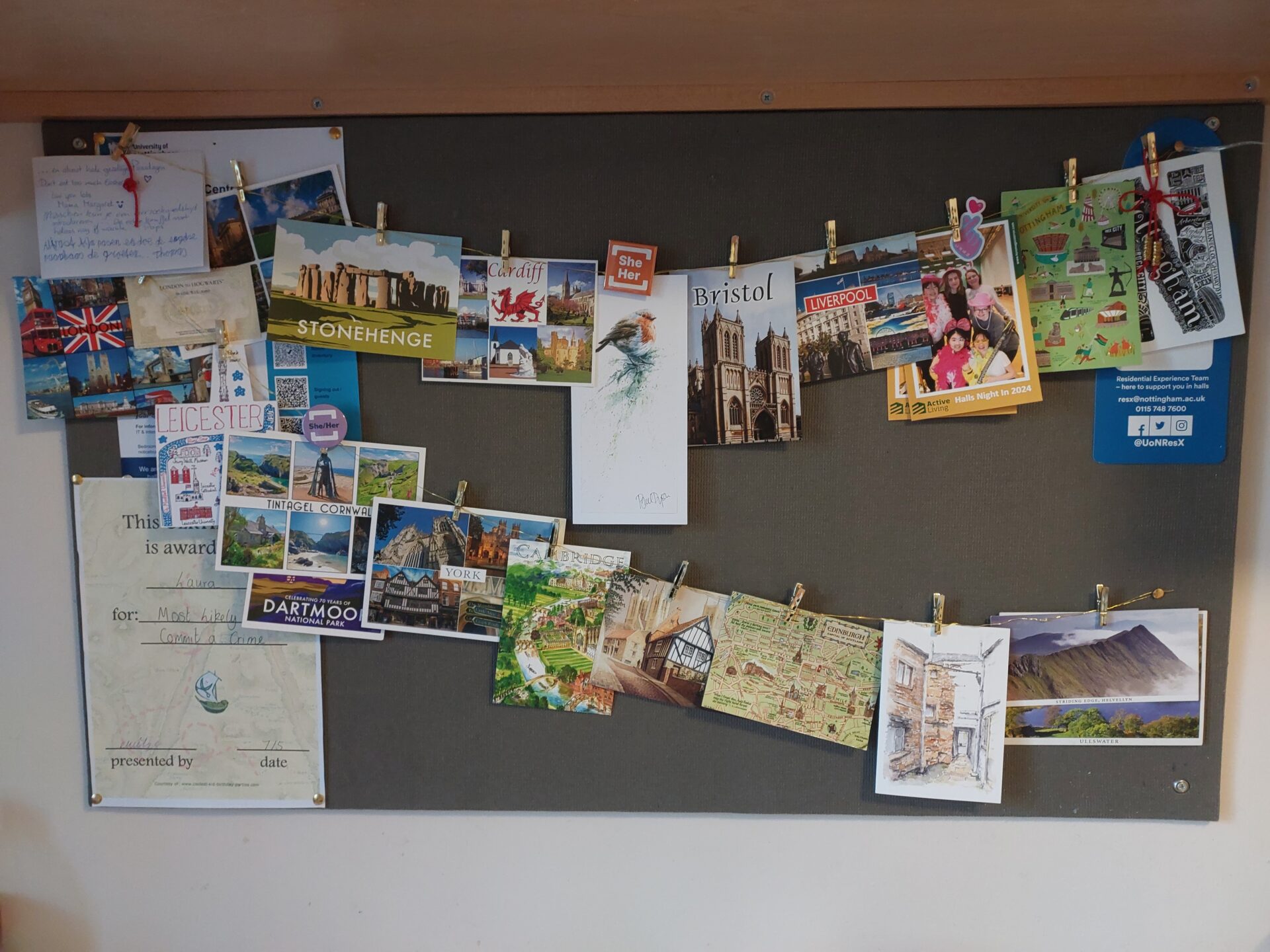
7. Free time
What are must-sees in the area?
I would say, travel as much as possible to make the best of your time. I did quite a lot of Saturday daytrips with the travel society and decided that I’d try to travel somewhere every Saturday. I almost did it, if not for exams hahahah. I mostly travelled by public transport, which makes the options a bit limited. It’s way easier to visit cities than nature reserves. As the prices rise the shorter in advance you book, I’d say book two weeks in advance for daytrips and for trips further away even more. Some trains have the option to reserve a seat, this could be really useful if it’ll be a busy train.
I actually liked all of the places I went to, although some more than others. The nearby places I would recommend are Nottingham centre, including the castle and the oldest pub, Beeston centre, Wollaton park and hall, and Attenborough nature reserve. These are doable either walking or by bus/tram. Famous places in the UK that I would recommend are London, Edinburgh, Liverpool, Cardiff, York, Cambridge, Oxford, and Bath. Some nature reserves and other places that were harder to reach by public transport but really worth the visit are Lake District, Peak District, Dartmoor National Park, Stonehenge, and Stratford-Upon-Avon. And if you don’t want to go that far but still want to see something beautiful you can go to Leicester, Lincoln, or Sherwood Forest. That were almost all the places I’ve been to, and they were all more than worth the journey. If you want to see your family and friends and do something fun it might be an idea for them to go to take the train Rotterdam/Amsterdam to London and meet up with you there ;).
What does not appear in a travel guide, but is definitely worth seeing/doing?
I think I answered this in the previous question…
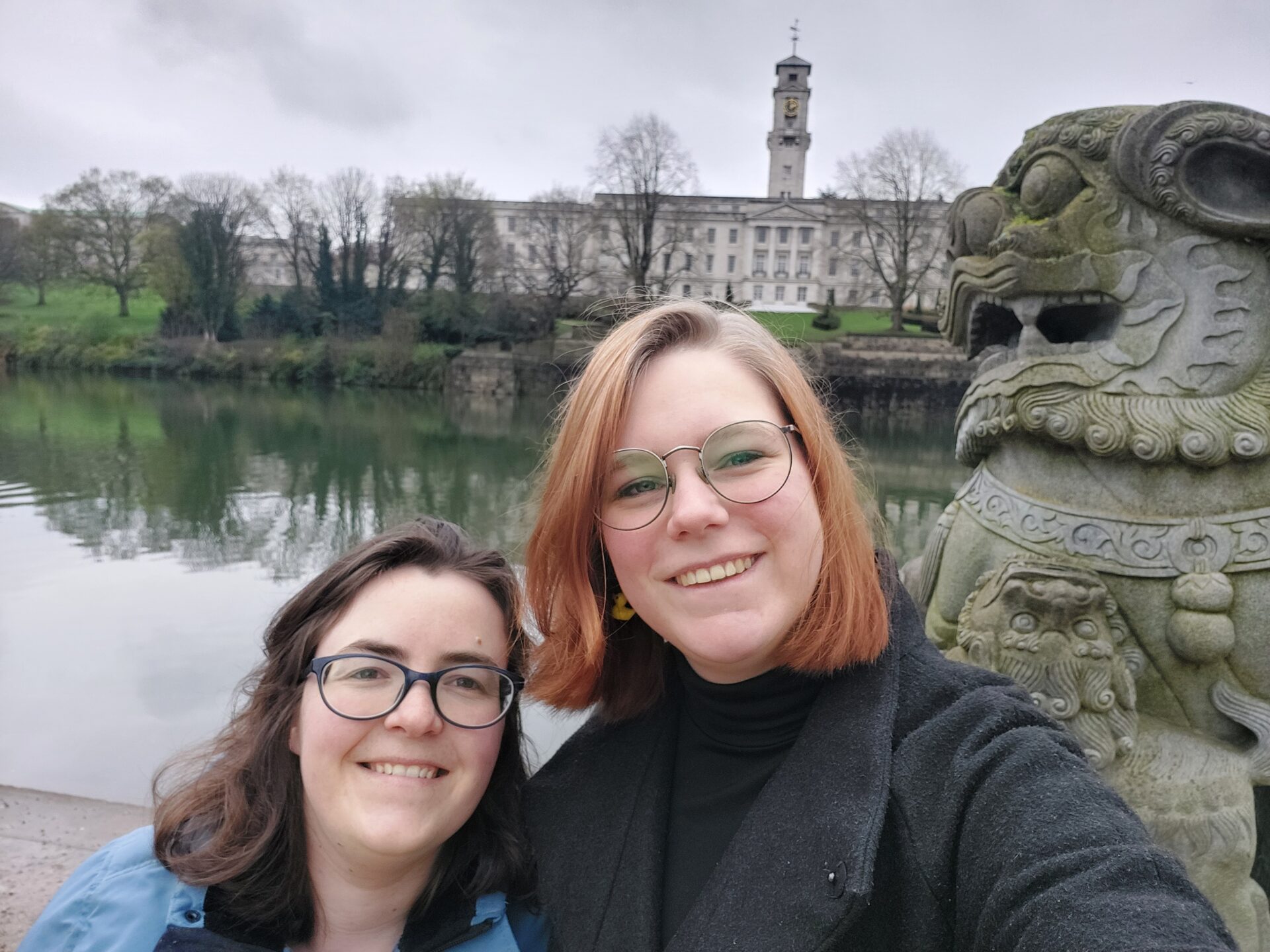
8. Challenges & best moment abroad
Any challenges? How did you deal with them?
In the beginning it was quite tough as I didn’t really know anyone. Luckily I soon made friends through different meetings and societies. I think it is really important to go out and meet people and do stuff: go out for a drink, join a society, do some sports. Not only to meet people, but also to keep some rhythm in your life, especially because I had few lectures. Yes you go on exchange to an university, but try to think of it as a large holiday travel. Yes please follow your lectures and pass your exams, but go travel. When you’re done you don’t want to think back and only think of the university. You want to think of the amazing friends and travels you did and how much you’ve seen. I thought of it like this: I’m in this other country now anyways, it’s closer to travel around this country from here than from the Netherlands. I made some Asian and Australian friends who even travel across the whole of Europe from the UK because it’s closer (and thus cheaper) 😉 .
I deviated a bit from the question hahhaha. The other thing I struggled with was being away from my partner and my family for so long. Luckily video calling is a thing, so if you experience the same thing make use of that. It helped me a lot to call them every week. My partner also came to visit me for a week halfway through. However, don’t make missing the people at home withhold you from making new friends.
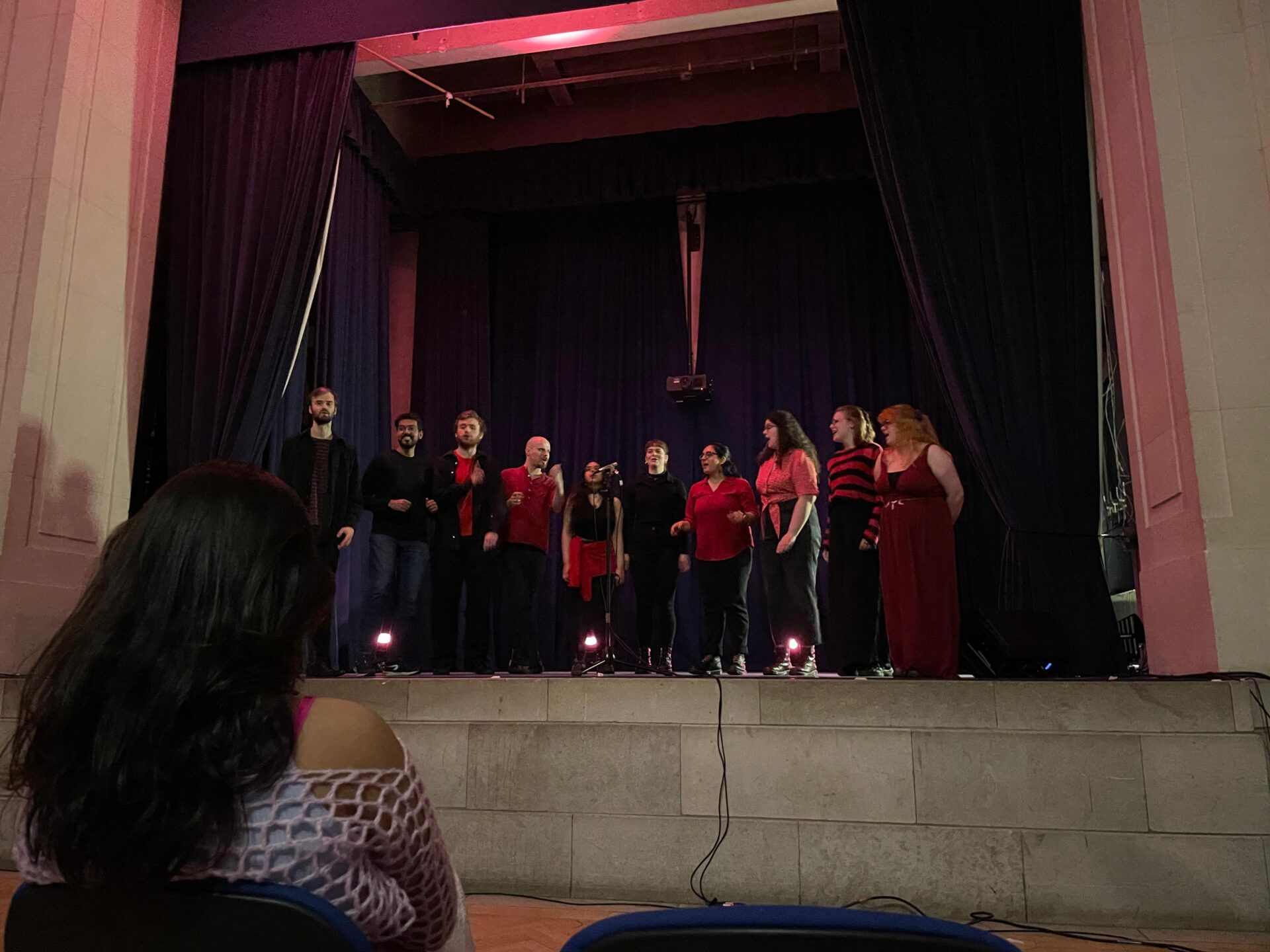
Best memory?
The whole experience. All the travels, the different culture and most of all the great friends I’ve made from all over the world. I’m really happy that I decided to do this.
8. Contact Details
Would you like to ask Laura more questions about her exchange?
Send her a mail: laura.snijders@wur.nl

